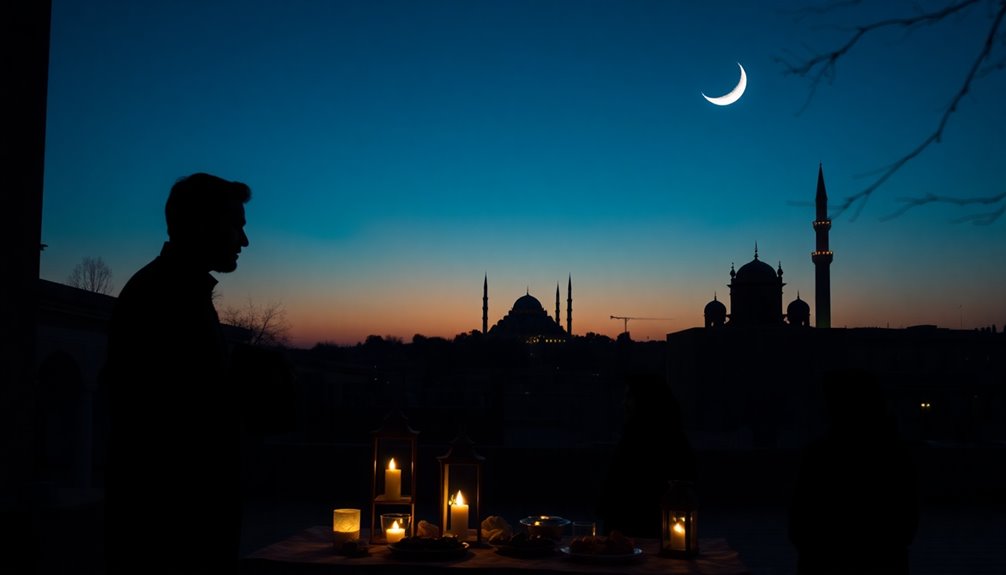Yes, you can have sex during Ramadan, but only after sunset and before dawn. Intercourse during daylight hours is strictly prohibited and considered haram, invalidating your fast for that day. The Quran clearly states that sexual relations are allowed at night once you've broken your fast. It's crucial to understand these rules to maintain both your spiritual duties and intimacy with your partner. Respecting this balance can enhance your relationship and guarantee a fulfilling experience during this sacred month. There's more to explore about how to navigate these guidelines effectively.
Key Takeaways
- Intercourse is strictly prohibited during daylight hours while fasting, as it is considered haram.
- Sexual relations are allowed only after breaking the fast at sunset until dawn.
- Engaging in daytime intercourse invalidates the fast and requires expiation (kaffarah).
- Expiation options include freeing a slave, fasting for two consecutive months, or feeding sixty poor people.
- Open communication with your partner is essential for navigating intimacy within the guidelines of Ramadan.
Intercourse Regulations During Ramadan

During Ramadan, it's crucial to understand that intercourse during the day is strictly prohibited, as it's considered haram for both men and women. This means that while you're fasting, you can't engage in sexual intercourse until after you've broken your fast at sunset.
According to the Quranic verse al-Baqarah 2:187, sexual relations are only permissible at night, allowing you to connect with your partner until dawn.
If you do engage in sexual intercourse while fasting, it invalidates your fast for that day, and you'll need to perform expiation, or kaffarah.
Expiation for Violating Daytime Fasting

If you violate your fast by engaging in sexual intercourse during Ramadan, you need to understand the expiation process, known as kaffarah.
This includes specific requirements like freeing a slave, fasting for two consecutive months, or feeding sixty poor people if the first two options aren't possible.
It's essential to comply with these rules and seek guidance for proper execution.
Kaffarah Requirements Explained
Engaging in intercourse during the daytime of Ramadan isn't just frowned upon; it invalidates your fast for that day and necessitates the fulfillment of specific kaffarah requirements.
If you find yourself in this situation, understand that the primary form of expiation involves freeing a slave if you're financially able.
If that's not an option, you'll need to fast for two consecutive months.
Alternatively, if fasting for two months isn't feasible, you can feed sixty poor persons as a means of atonement.
This guidance highlights the importance of understanding the rules surrounding expiation, ensuring compliance with Islamic teachings, and rectifying any unintentional violations of fasting during this holy month.
Types of Expiation
Understanding the types of expiation for violating daytime fasting is crucial for anyone observing Ramadan. If you've unintentionally or intentionally broken your fast, you have a few options for expiation:
- Free a slave if you're financially able.
- Fast for two consecutive months.
- If fasting isn't feasible, feed sixty poor persons.
- Remember that charity is a significant part of expiation.
These methods reflect the importance of maintaining your commitment to fasting during Ramadan. Engaging in sexual activities during the day can lead to a need for expiation, so it's essential to be aware of these options.
Importance of Compliance
While it may be tempting to overlook the rules during Ramadan, compliance with fasting regulations is essential for maintaining spiritual integrity.
Engaging in sexual activity with your wives during daylight hours is considered haram and invalidates your fast. If you intentionally violate this rule, you must perform expiation (kaffarah) as outlined in Islamic teachings.
This may involve freeing a slave, fasting for two consecutive months, or feeding sixty poor persons if the other options aren't feasible. A hadith from the Prophet Muhammad (PBUH) emphasizes charity as a valid form of atonement.
Understanding these requirements helps you address any violations appropriately and reinforces the importance of adhering to fasting rules during this holy month.
Nighttime Sexual Relations Guidelines

During Ramadan, you can enjoy sexual relations with your spouse after breaking your fast at sunset until dawn.
Remember to perform ghusl before the Fajr prayer and guarantee both of you consent to the intimacy.
It's important to maintain respect and control over your desires to honor the spirit of this holy month.
Timing and Permissions
Nighttime sexual relations in Ramadan are allowed after sunset, giving couples the opportunity to connect once the fast is broken. This intimacy is permissible from Maghrib until dawn, as specified in Al-Baqarah 2:187.
However, it's important to remember that sexual activity during fasting hours invalidates the fast and requires expiation if done intentionally.
- Respect and understanding are key for husbands and wives.
- Kissing and affection are permitted during fasting but shouldn't lead to arousal.
- Always prioritize spiritual devotion alongside physical intimacy.
- Remember to perform ritual purification (ghusl) after intercourse before the Fajr prayer.
Ritual Purification Requirements
After engaging in sexual relations during Ramadan nights, you must perform ghusl, which is vital for restoring your state of ritual purification.
Ghusl involves a full-body washing that guarantees you're spiritually clean before performing the Fajr prayer. This requirement stems from the hadith of the Prophet Muhammad (PBUH), emphasizing the need for purification after sexual relations.
Make sure to schedule your ghusl so that it's completed before dawn, as failing to do so invalidates your prayer and could disrupt your other acts of worship during Ramadan.
Remember, maintaining ritual purity is essential for the integrity of your spiritual practices during this holy month.
Prioritize this purification to stay connected with your faith.
Mutual Consent Importance
While engaging in sexual relations during Ramadan can be a natural part of married life, it's essential that both partners give their mutual consent. This mutual understanding reflects respect and strengthens intimacy between husbands and wives.
Open communication about desires and boundaries guarantees a comfortable experience during the permissible hours after breaking the fast.
- Prioritize mutual consent to enhance emotional connection.
- Discuss personal boundaries to create a respectful dynamic.
- Keep the spiritual significance of Ramadan in mind while being intimate.
- Balance physical needs with spiritual commitments throughout the month.
Importance of Fasting and Self-Discipline

Fasting during Ramadan isn't just about abstaining from food and drink; it's a powerful tool for spiritual growth and self-discipline.
This holy month challenges you to develop control over your desires, extending beyond just food and drink to include intimacy with your wives during daylight hours.
The Quran highlights fasting's importance in building piety and mindfulness, urging you to focus on spiritual needs over physical ones.
This practice fosters empathy for the less fortunate, allowing you to experience hunger and thirst, which strengthens your sense of community.
Ultimately, mastering self-discipline during Ramadan can lead to lasting personal growth, helping you carry these values into your daily life well after the holy month ends.
Cultural Influences on Sexual Practices

During Ramadan, how you approach intimacy can be deeply influenced by cultural perceptions and social norms.
In some cultures, wives and husbands may feel pressured to adhere to strict modesty and restraint, while others adopt a more relaxed attitude towards physical intimacy during permissible hours. This disparity can shape your experiences and discussions around sexual relations.
- Conservative views may discourage any physical intimacy.
- Taboo topics lead to limited education on permissible practices.
- Community practices can dictate individual behaviors regarding intimacy.
- Celebrations like Eid al-Fitr often shift attitudes, encouraging connection.
Understanding these cultural influences can help you navigate intimacy during this holy month with greater awareness and sensitivity to your surroundings.
Impact on Marital Relationships

As couples navigate the unique dynamics of Ramadan, open communication about sexual needs and expectations becomes essential. Fasting can create emotional and physical tensions that may affect intimacy. However, you can strengthen your relationship by engaging in non-sexual forms of affection during the day. The restrictions on sexual relations can lead to a greater appreciation for nighttime intimacy, fostering deeper emotional connections. Participating in shared spiritual practices, like prayers and iftar meals, enhances marital bonds and creates a supportive environment.
| Aspect | Impact on Marital Relationships |
|---|---|
| Open Communication | Essential for addressing intimacy needs |
| Non-Sexual Affection | Strengthens connection during fasting |
| Nighttime Intimacy | Deepens emotional bonds |
| Shared Spirituality | Enhances marital support |
| Respecting Guidelines | Maintains spiritual focus in relationships |
Common Misconceptions About Intimacy

While many people believe that all forms of physical affection are off-limits during Ramadan, this isn't entirely true. You can express affection through kisses and touches, as long as they don't spark sexual desire.
However, there are important limits set around sexual relations:
- Intercourse is strictly prohibited during daylight hours.
- Nighttime activities can't compensate for any daytime violations.
- Only direct sexual intercourse invalidates the fast; other forms of intimacy don't necessarily do so.
- All sexual activity, including for wives during menstruation, is forbidden while fasting.
Understanding these misconceptions can help you maintain intimacy within the guidelines of Ramadan, enhancing your relationship while adhering to your faith.
Frequently Asked Questions
Can I Sleep With My Boyfriend During Ramadan?
You might wonder if you can sleep with your boyfriend during Ramadan.
While sharing a bed is acceptable, you should be mindful of the spiritual significance of this month. Engaging in intimate activities may distract from your fasting and reflection.
It's essential to communicate openly with your boyfriend about your feelings and expectations.
Focus on building emotional intimacy during Ramadan, as this can strengthen your relationship while honoring the month's values.
Can I Touch My Wife's Private Parts During Fasting?
Touching your wife's private parts during fasting is generally discouraged. It could lead to sexual arousal, which might compromise your fast.
Scholars suggest that light touching and caressing are acceptable, but you need to exercise self-control to avoid situations that could escalate.
Focus on maintaining open communication about boundaries while respecting the sanctity of the fasting period.
Do I Have to Shower After Sex in Ramadan?
After a night of passionate intimacy, you might wonder if you need to shower. Yes, you must perform ghusl, a ritual purification that washes away not just physical remnants but also reaffirms your spiritual readiness.
Think of it as a cleansing rain after a storm, renewing both body and soul. Until you complete this purification, your prayers, including the Fajr, won't hold their sanctity.
Stay connected to your faith through this essential act of cleanliness.
Can We Release Sperm During Ramadan?
Releasing sperm during Ramadan isn't allowed while fasting, as it invalidates your fast for that day.
If it happens without intercourse, you'll need to make up that fast, but you won't have to do anything extra if it wasn't intentional.
It's best to practice self-restraint and avoid actions that could lead to ejaculation during the day.
You can engage in sexual relations after breaking your fast at sunset until dawn.
Conclusion
In the tapestry of Ramadan, intimacy weaves a delicate thread, reminding couples of their bond. While daytime fasting calls for restraint, the night opens a gateway to connection. Embrace this sacred time to strengthen your relationship, allowing love to flourish like blossoms after rain. Remember, it's not just about abstaining; it's about deepening understanding and respect. So, cherish those moonlit moments, nurture your partnership, and let the spirit of Ramadan enrich your love story.










